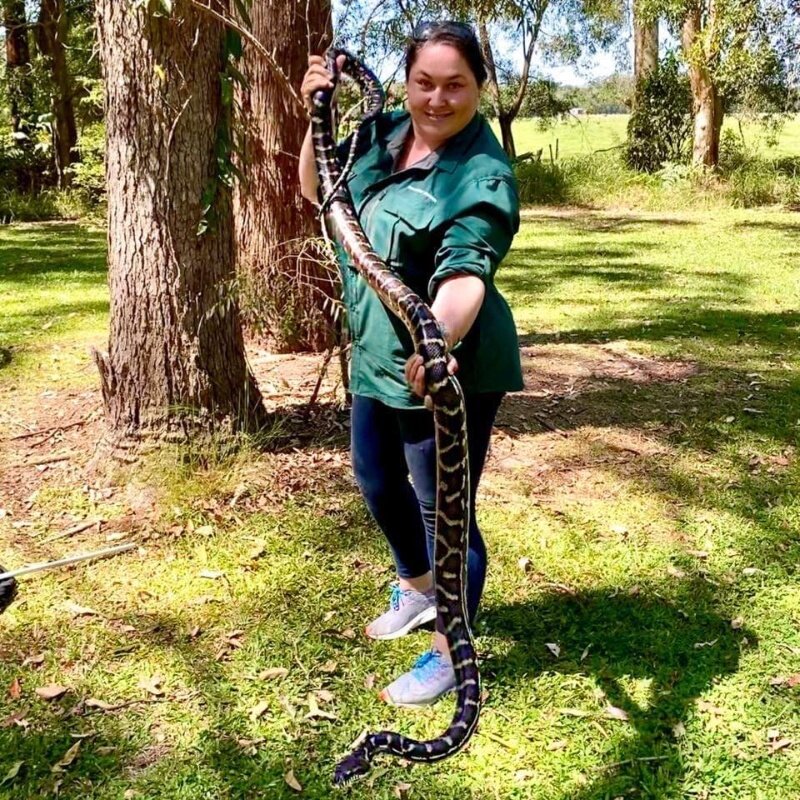Snake catcher overcomes phobia to launch career in reptile wrangling
As the days are getting warmer, the snakes are on the move and soon enough, babies will be born. Years ago, this would have been a source of terror for one time snake-phobic, Gemma Smith.
“I sort of did the opposite of what most people with phobias do, and decided to overcome my dread of snakes by learning more about them,” Gemma said. “It’s kind of funny that now, my career is as a professional snake catcher!”
Woombye-based Gemma came to the Sunshine Coast from Sydney, where she never saw snakes anywhere. “I was warned that I would have to get used to them here, because there are lots of them in the area,” she said.
“In order to overcome my phobia, I started studying animal ecology, and getting educated about snakes. I’ve turned my fear into a very deep respect for them and the role they play in the natural environment.
“One of the biggest problems is that people have the mistaken idea that snakes are evil, and that they are lying in wait for them, or they are out to “get them”,” said Gemma.
“In reality, snakes have very primitive brains. They don’t have emotional responses or thoughts like people do. They really only have three drivers; to eat, mate and find shelter, and that’s it. In order to protect themselves, snakes such as Eastern Browns will put on a defensive display but what they are trying to do is scare you away from them. Given half an opportunity, most snakes will get out of your way before you even know they are around.
“Statistically, most people in Australia are bitten by snakes while they are attempting to kill them. “I guess what I would really like people to do if they see a snake is not take a shovel to it, because when it is all said and done, the snake will defend itself. This is when people typically get bitten,” Gemma said.
“I think that often, people are reluctant to call a snake catcher because of the cost involved so I generally ask people to take a photo from a safe distance (if they can), and send it to me so that I can try and identify it for them. Often-times the snake will get out of the way of its own accord.
“ ... in the garden, stomp around as heavily as you can. Snakes can’t hear you but they can feel the vibration of your footsteps”
“I definitely do not encourage anyone to try and catch or handle baby snakes because even newly hatched snakes have as much venom as big ones. It is the only defence they have and babies are afraid that everything is trying to eat them, so they will bite. I am far more concerned about handling baby brown snakes than the adults.”
Many people in the hinterland keep chooks, and this situation creates food sources for snakes. “Snakes are attracted to chook pens because the chook food and eggs are a source of food for rats and mice. So while the snakes are there to clean up vermin, it can be a bit of a shock to find one in the chook pen. I always tell people that we would be overrun with vermin if it weren’t for snakes. They have an essential role in keeping a balance in the environment. Pythons will prey on rodents AND chooks but what we’d like to avoid is attracting deadly snakes such as Eastern Browns which are rodent specialists”.
According to Gemma, when it comes to deterring snakes, there is not a whole lot that you can do except take some practical, common sense steps to make your property less attractive for them.
“I tell people to keep a tidy property as a starting point. Pick up loose sheets of roofing material, timber and tarps; anything that would be attractive for snakes to shelter under. Also, make sure lids are tightly closed on compost and waste bins.
“When it comes to being out in the garden, the key is to stomp around as heavily as you can. Snakes can’t hear you but they can feel the vibration of your footsteps. Always wear boots, thick gloves and long sleeves if you are weeding in the garden. Snakes fangs are quite short and most cannot penetrate good thick gloves or boots.”
If you spot a snake in your house, Gemma recommends that you close the door to the room, roll up a towel and place it underneath the door so that the snake can’t get out. That way it can safely be captured and removed.
“I work in collaboration with Rhys Chapman at Rhys Chapman Wildlife Services, Jordan Sparrow of All Coast Reptile Relocations and Luke Huntley at Snake Catcher Noosa, so between us, we can generally help people ID snakes, even from shed skins, and safely relocate them,” said Gemma. “Snakes are protected for a good reason, and between us, our goal is to educate people, rather than scare them.”
• Gem Snake Catcher 0484 061 206 • Rhys Chapman Wildlife Services 0422 090 480. All Coast Reptile Relocations 0408 030 881. Snake Catcher Noosa 0499 920 290.
=

